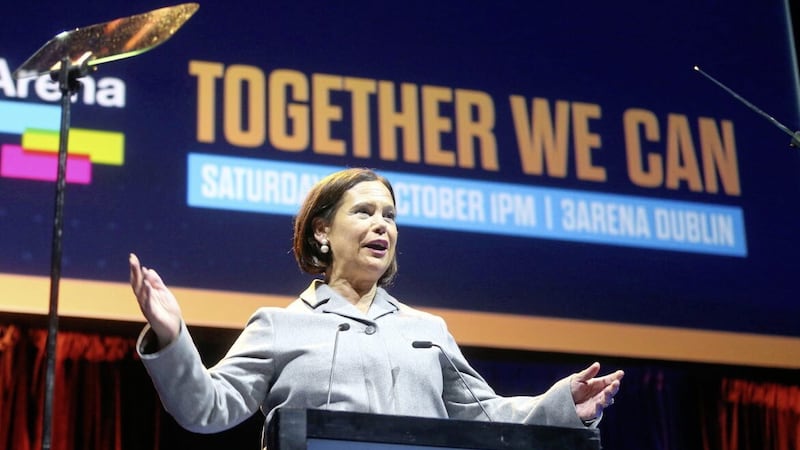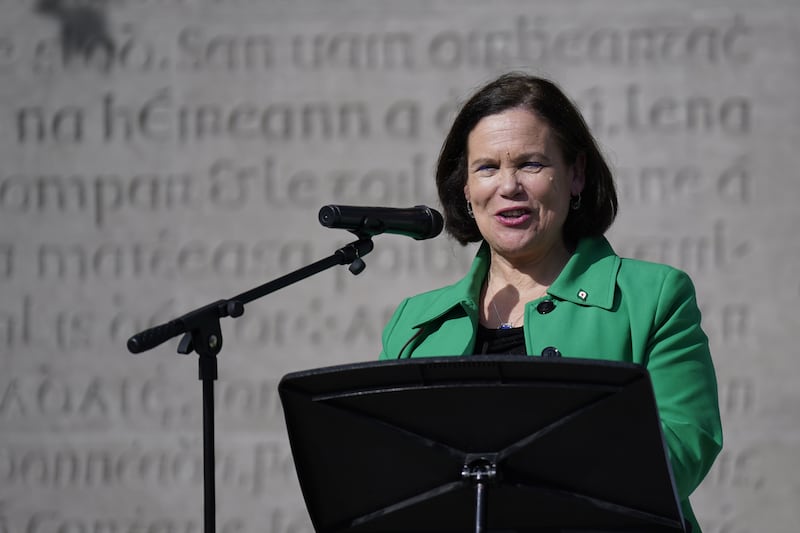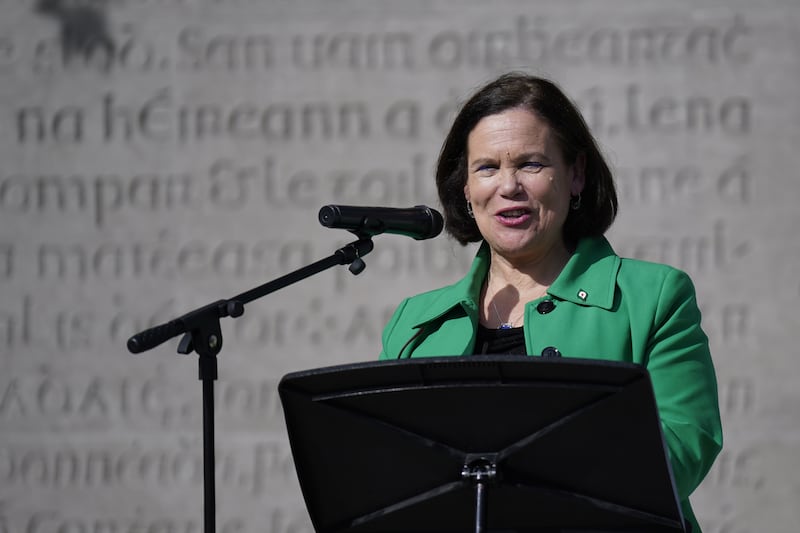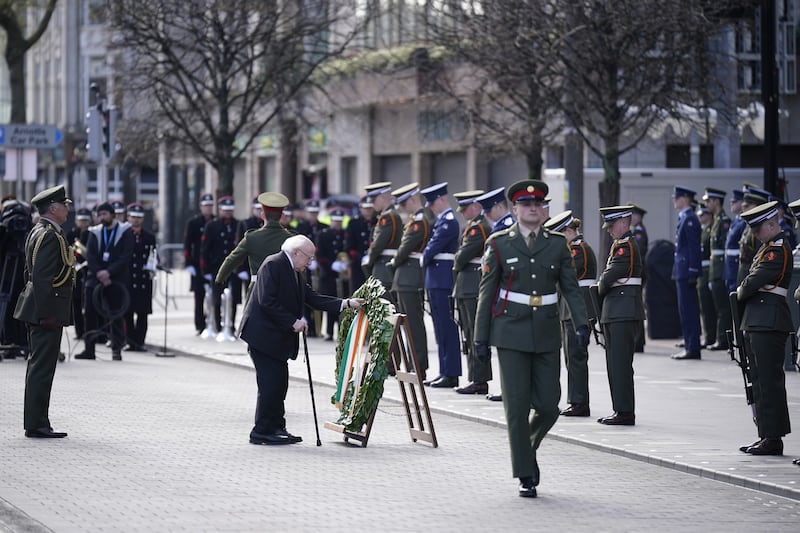"I THINK they made a bad decision," says Shane Ross of how Sinn Féin instructed its members not to speak to him for his new biography of party president Mary Lou McDonald, which charts the Dubliner's rise through the party ranks and explores her largely unknown family background.
"I think her instinct probably would have been to cooperate. But as you know, the party likes everybody to be 'on message'. I think they probably decided 'he's not one of us' and so they tried to deny [the book] any oxygen."
McDonald herself declined to speak to Ross, a former long-serving senator, TD and cabinet minister whom the Sinn Féin leader once worked alongside on the Dáil's Public Accounts Committee (PAC), saying she felt the book was "premature".
Despite this lack of cooperation, Mary Lou McDonald: A Republican Riddle hit bookshelves earlier this week as a 400-page tome packed with quotes and illuminating background information gleaned from over 200 interviews and many hours of research.
"I would never have written an official biography anyway, but had she cooperated, it would have been a different book," explains Ross, a former business editor of the Sunday Independent.
"I'm kind of glad she didn't in some ways – because then I wouldn't have dug. Not having her help meant I had to go a different route and so it made it more of an investigative book rather than a biography."
A lot of the the 'digging' in question involved the author unearthing details about McDonald's father, Paddy, who separated from her mother, Joan, when the future Sinn Féin leader was only 10.
McDonald, who is married with two children, almost never speaks of her father in interviews whenever the subject turns to 'family' – something Ross describes as "the full airbrush" treatment.
As readers will discover, Gerry Adams's future protégée had barely been born when Paddy McDonald was involved in a near fatal car accident. Thrown through the windscreen, he sustained serious injuries in the 1970 crash which quickly destroyed his livelihood as an in-demand builder.
Deciding to go down the compensation route, Paddy had the misfortune to entrust a dodgy lawyer to act on his behalf: the promised monies never materialised, plunging the family into debt and forcing further and protracted legal wranglings that dragged on for well over a decade.
Stress led to heavy drinking and a couple of alcohol-related brushes with the law – one involving a public order charge as a result of an incident in the grounds of the Russian Embassy, which made local headlines – and the collapse of the McDonald's marriage: Paddy moved out of the family home in the comfortable south Dublin suburb of Rathgar, leaving Joan to raise Mary Lou and her three siblings.
"I found out all this stuff about him which was fascinating, to be honest," Ross tells me.
"And all of it was in the public record. It was all in [Irish politics and current affairs publication] Magill magazine, who interviewed him about his unfair treatment in the courts in 1985.
"But it wasn't known: this article had been sitting in the Magill archives for nearly 40 years without anyone spotting that 'Mr McDonald' was in fact Mary Lou McDonald's father. I've spent the past year praying that Magill don't read their own records, because they would have broken the story first."
Mary Lou McDonald's upbringing also ties in with the book's sub-title, 'A Republican Riddle' – a 'riddle' as in how did a middle-class, privately educated Dubliner who only joined Sinn Féin when she was well into her 20s following an abortive stint with Fianna Fáil (an inconvenient fact she was caught out trying to deny a few years ago) end up becoming the head of a republican party long-dominated by working class men with either family ties to the 'armed struggle' or actual criminal records?
The answer, according to Ross, is simple: Gerry Adams, the man she replaced as Sinn Féin president. Ross explains how Adams selected her as a potential successor who would be more palatable to southern voters due to her lack of involvement in the Troubles, repeatedly offering public validation of this 'outsider' to those with more concrete IRA histories by standing alongside her at a succession of republican commemorations and funerals, including that of Martin McGuinness, for whom she was a pall-bearer (a photo of this is used on the book's cover), and Bobby Storey.
"It's quite obvious that she was fast-tracked all the way up from the very beginning," says Ross, who served as the Republic's Minister for Transport, Tourism and Sport from 2016 to 2020.
"She was in photographs with Adams in public within less than a year of her joining the party.
"When I was on the PAC with her, I didn't realise that she was doing quite so much in Northern Ireland. She was going to an awful lot of commemorations in the north and this definitely convinced a large number of [republicans].
"I think that did work, in that she had the support of Adams and McGuinness when she was doing all this. There's that famous photograph of her at a 1916 commemoration dinner in Derry where she was the key speaker and she's standing at a lectern with a picture of two Armalites stuck to the front of it.
"Now, that wouldn't have gone down at all well in the south, but she did it because she'd realised that these were the things she had to do to get the northern leadership's support – and she did."
While the book does include some interviews with 'former combatants' who are disgruntled at McDonald's anointment by Adams and co, Ross admits to being surprised by the level of affection he discovered for the woman most bookies are backing to be Ireland's next Taoiseach during a visit to the heart of Republican west Belfast.
"I walked into the Andersonstown Social Club unannounced and told them I was writing a book," recalls Ross.
"This was where I thought I'd find resistance to a middle class southern woman being the leader of Sinn Féin – that she was 'no Gerry Adams' – but they were almost unanimous in saying 'no, she's the only person in the south who sticks up for us'.
"There was a vote of no confidence [in the government] in the Dáil that night and they were all rooting for Mary Lou to get it through."
In the end, Sinn Féin lost the vote – but as Ross notes in the book, "Mary Lou's methodical cultivation of northern republicans has worked".
With her party's recent island-wide electoral successes, Sinn Féin are poised to assume power for the first time in the Republic's history. Ross admits that the prospect of a Sinn Féin government, never mind Mary Lou McDonald as its leader, is not something he ever expected to see.
"I was in politics for 39 years," he says, "and Sinn Féin basically didn't exist as a party in the Dáil for most of that time. So their rise in the south has been absolutely extraordinary in the last 15 years.
"We never anticipated that it would happen. And that makes Mary Lou McDonald possibly the most significant politician on the island, because she is the leader of its largest party.
"She's got a huge moral mandate in democratic terms, which of course you'd never thought you'd be saying about Sinn Féin 20 years ago."
However, on the never-more-topical subject of a potential border poll on the re-unification of Ireland, Ross feels that McDonald may currently be slightly more wary of demanding such a seismic survey of public opinion now that significant political power is tantalisingly within reach for her party.
"I think she's pulling back on a border poll at the moment," he says.
"I mean, it's quite obvious from the rhetoric over the weekend at the [Ireland's Future] conference in Dublin. She sees the danger of holding one too early, because it would probably be defeated. And, if it was defeated, it would put it back for a very long time.
"But I think she sees her destiny as being someone who unites Ireland. And she's certainly in a better position for doing that at the moment. I think what she's got to do, though, is to is to reach out the hand in a more meaningful way to those who are opposed to it in Northern Ireland. I don't think that has been achieved yet."
Apparently, the author has yet to send McDonald a copy of the new book.
"Well, I'm waiting to see whether she comes to the launch," Ross explains.
"I'll certainly give her a copy then, but I'm sure she's already had a look at it by now. I look forward to seeing what her response is."
Over to you, Mary Lou.
:: Mary Lou McDonald: A Republican Riddle by Shane Ross is out now, published by Atlantic.








